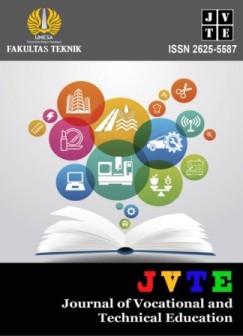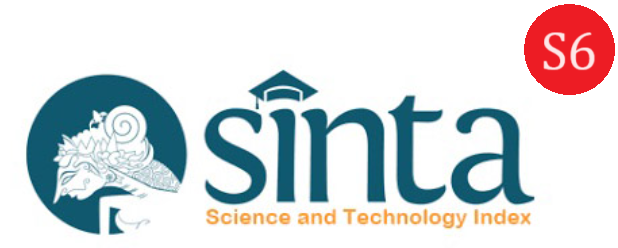PENERAPAN MODEL PEMBELAJARAN PROJECT BASED LEARNING UNTUK MENINGKATKAN HASIL BELAJAR MAHASISWA
DOI:
https://doi.org/10.26740/jvte.v1n1.p28-37Abstract
ABSTRAK
Kemampuan membuat sambungan las merupakan salahsatu keahlian yang dibutuhkan saat ini. Seharusnya, mahasiswa yang telah lulus mata kuliah las akan bisa membuat sambungan las dengan baik, akan tetapi mahasiswa yang telah menempuh mata kuliah las belum bisa melakukan. Pemahaman materi dan keterampilan praktek yang kurang menyebabkan target lulusan tidak terpenuhi. Dari permasalahan tersebut maka dirasa perlu dilakukan PTK dengan metode Pembelajaran Berbasis Proyek atau Project Based Learning (PBL) dengan harapan kegiatan praktek bisa menjadi lebih terarah dan efektif sehingga tujuan universitas bisa terpenuhi. Penelitian tindakan kelas terdiri dua siklus. Setiap siklus harus mencapai keberhasilan pada tingkat tertentu. Dalam penelitian ini digunakan teknik observasi, kuisioner dan tes kinerja berupa jobsheet. Teknik analisis data bersifat kuantitatif. Saat observasi aktivitas mahasiswa dalam kegiatan praktek, penentuan nilai dilakukan dengan cara menentukan rata-rata nilai yang diberikan oleh observer selama waktu praktek berlangsung. Data kuantitatif didapat dari mengamati hasil praktek dan besar nilai sesuai rubrik penilaian yang meliputi beberapa aspek. Berdasarkan hasil pengamatan peneliti dapat disimpulkan bahwa dengan penerapan model pembelajaran aktivitas mahasiswa selama perkuliahan praktek las menjadi lebih aktif. Hasil belajar mahasiswa setelah kegiatan praktek las menggunakan model pembelajaran berbasis proyek meningkat. Dari dua siklus yang sudah dilakukan pada PTK terjadi kenaikan nilai rata-rata kelas dari 61,8 ke 89,8. Akan tetapi terjadi penurunan lama pengerjaan karena mahasiswa belum terbiasa dengan job sheet berupa proyek membuat konstruksi.
Kata Kunci: Hasil Belajar Mahasiswa, Model Pembelajaran, Sambungan Las, Project Based Learning, Pembelajaran Berbasis Proyek.
ABSTRACT
The ability to make welded connections is one of the skills needed today. Supposedly, students who have passed welding courses will be able to make a welding connection well, but the students who have passed the courses are not able to make a weld connection properly. Good understanding of the theory is not followed by practical skills so the target of graduates will not be fulfilled. From these problems, it is deemed necessary to do PTK with Project Based Learning (PBL) methods in the hope that practical activities can be more directed and effective so that the university's objectives can be fulfilled. Classroom action research consists of two cycles. Each cycle must achieve success at a certain level. This study used jobsheet observation, questionnaire and performance tests techniques. Data analysis techniques are quantitative. When observing student activities in practical activities, the determination of values was done by determining the average value given by the observer during the time of the practice. Quantitative data is obtained from observing the practice results and the amount of value is according to the assessment rubric including several aspects. Based on the observations of the researchers, it can be concluded that by applying the learning model of student activities during lectures, the practice of welding becomes more active. Student learning outcomes after welding practice activities using project-based learning models increased. By two cycles carried out in PTK, there has been an increase in the students average score from 61.8 to 89.8. However, there was a decrease of work time because students were not familiar with job sheets in the form of construction projects.
Keywords: Student Learning Outcomes, Learning Models, Welding Connections, Project Based Learning
References
[2] Arikunto, S. Suhardjono dan Supardi. 2009. Penelitian Tindakan Kelas. Jakarta: Bumi Aksara.
[3] Bacer, Areca, et al, 2011. œProject-based Learning Model, Relevant Learning for the 21st Century, USA, 2011,
[4] Sadiman, dkk. 2008. Media pendidikan. Jakarta: PT. Raja Grafindo Persada.
[5] Slameto. 1995. Belajar dan faktor-faktor yang mempengaruhinya. Jakarta: Rineka Cipta.
[6] Sudjana dan Rivai. 2005. Media Pengajaran. Bandung: Sinar Baru Algensindo.
Downloads
Published
How to Cite
Issue
Section
 Abstract views: 2362
,
Abstract views: 2362
, PDF Downloads: 1252
PDF Downloads: 1252






